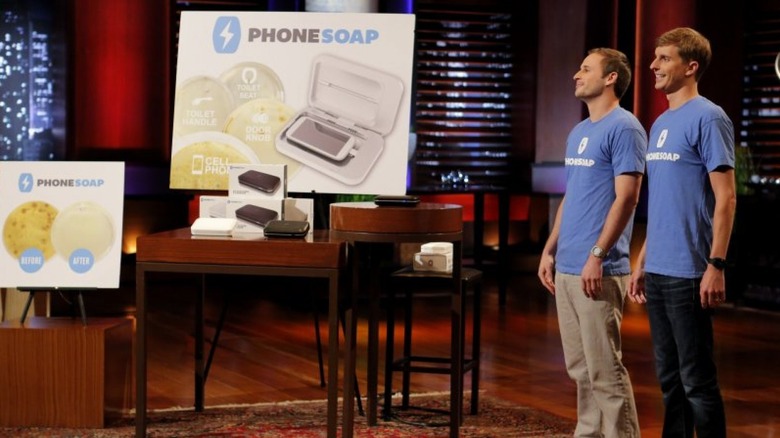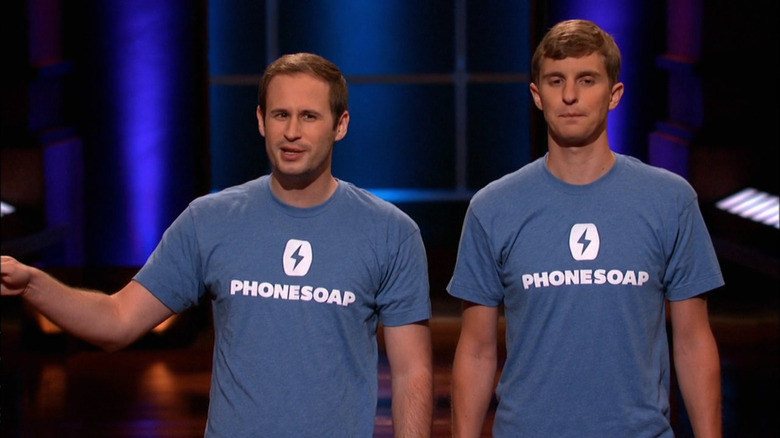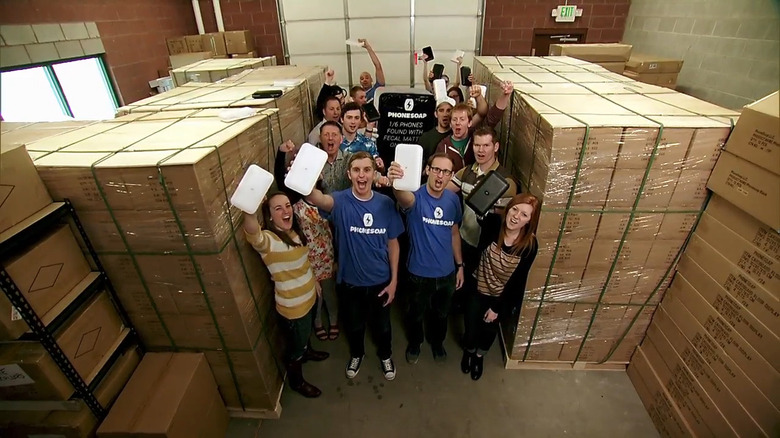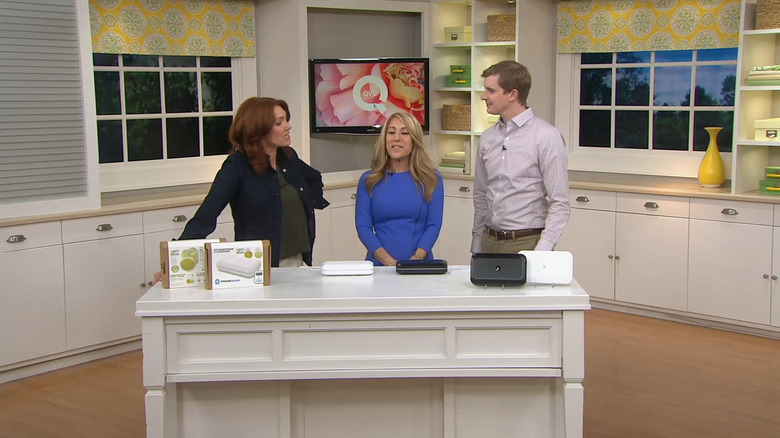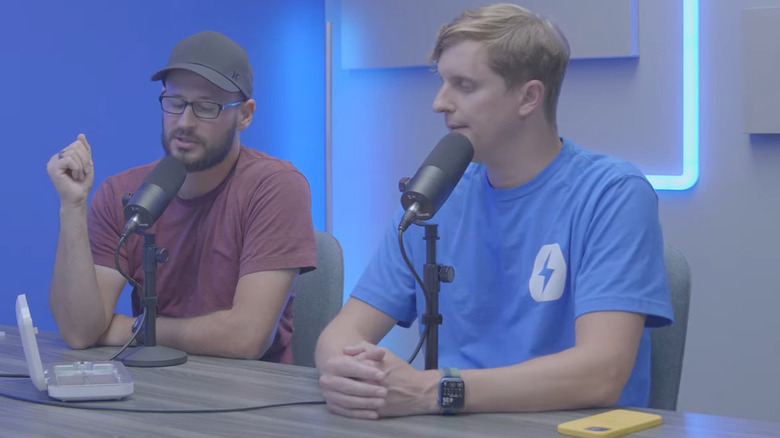What Happened To Phonesoap From Shark Tank Season 6?
The sixteenth episode of the sixth season of "Shark Tank" premiered on ABC on January 30, 2015, to 7.9 million viewers. In the fourth and final pitch of the week, the panel of potential investors was pitched on PhoneSoap, a UV light-based sanitizer for smartphones (and anything else that could fit) which also allows you to charge the phone while disinfecting it. Though the titular Sharks showed initial skepticism at needing an electronic device for this purpose, the PhoneSoap founders made a good case for its advantages over topical disinfectants, particularly as far as avoiding damage to users' phones. PhoneSoap founders Wesley Laporte and Dan Barnes found themselves fielding multiple offers, eventually striking a deal with Lori Greiner when they counter-offered to each other's satisfaction.
PhoneSoap had been on the market for a matter of months when its episode of "Shark Tank" was shot, and its strong early sales proved to be a sign of things to come. By the time the show was celebrating its 15th season in 2023, PhoneSoap had sold nine figures worth of product, easily placing it on the list of the highest-grossing products in the show's history. The global COVID-19 pandemic, which led to an increased awareness of how we spread germs, also played a significant role in public awareness of PhoneSoap. Let's take a look at exactly how PhoneSoap did on "Shark Tank" and precisely how it grew coming out of the show, thanks to the increased exposure and Greiner's investment.
What happened to PhoneSoap on Shark Tank?
Wesley Laporte and Dan Barnes entered the set of "Shark Tank" seeking a $300,000 investment for 7.5 percent of PhoneSoap, their business selling UV light-based smartphone sanitizing boxes. Almost immediately, some of the Sharks seemed skeptical that there was a need for such a product given the existence of disinfectant wipes, but Laporte and Barnes noted that this is not a good solution because topical disinfectants like alcohol can destroy the oleophobic coating on touchscreen glass. With that out of the way, they got down to business: The founders had already sold 60 percent for $800,000, feeling they needed that kind of deal to get the funding needed to go to market. And in five-and-a-half months of sales, PhoneSoap had already sold $537,000 worth of product with availability online and in 400 Staples stores nationwide.
Barbara Corcoran pulled out first, unconvinced it was better than a baby wipe. Kevin O'Leary offered the $300,000 for a $6/unit royalty until he recouped the investment, with the royalty dropping to $3 until he made $1.2 million on it but pulled out when the founders stood firm on their valuation. Mark Cuban offered $300,000 for 20% contingent on delivering a unit that can clean a phone in 30 seconds and be made for $12, but then Lori Greiner jumped in at $300,000 for 15 percent. Asked if she could meet PhoneSoap in the middle, she cut her ask to 10 percent, and they agreed to a deal.
What happened to PhoneSoap after Shark Tank?
PhoneSoap did well enough quickly enough that it was featured in an official "Shark Tank Update" segment in May 2016. In that segment, it was revealed that PhoneSoap had upscaled to having 12 employees and had done $4.9 million in sales in the year since the episode where the product was featured aired. The business continued expanding from there. In the February 2018 issue of Utah Business, the company was profiled, with Wes Barnes reflecting on his experience on the show. "It's very scary, even though they prep you," he said. "It was a long walk to the sharks. You have to stand on your cue and stay there for one or two minutes, silently staring down the Shark Tank stars."
In January 2019, as PhoneSoap tried to move into the B2B space, particularly food processing, biotech, and hospitals, a rival company, CleanSlate UV, filed an FTC complaint, alleging PhoneSoap made false claims. It's not clear if that ever went anywhere, though. Meanwhile, Lori Greiner's website pegs PhoneSoap at having grossed $150 million in sales in the seven years after its "Shark Tank" episode aired. In time, especially with the onset of the global COVID-19 pandemic, PhoneSoap carved out a prominent spot in a growing phone sanitization market. In 2023, in celebration of the 15th season of "Shark Tank," the show released a list of the highest-grossing products in show history, with PhoneSoap in 13th place via $187 million in sales.
Is PhoneSoap still in business?
As of this writing, PhoneSoap is not only still in business but also continues to be massively successful. When it comes to the flagship UV sanitizer products, there are nine different SKUs, which now branch out beyond phone-sized sanitizer boxes. The flagships are the PhoneSoap 3 at $89.95 and the $129.95 MSRP PhoneSoap Pro, with the latter killing the germs in five minutes. Those products are also joined in the consumer line by the larger, $199.95 MSRP HomeSoap, as well as a toothbrush sanitizer, a sanitizing water bottle, the $99.95 battery-powered PhoneSoap Go, the $99.95 PhoneSoap wireless with wireless Qi charging, and the original PhoneSoap Basic for $59.95. On top of the consumer line, there's also the ExpressPro, a "Rapid UV Disinfector," which is big enough to fit tablets and disinfects in 30 seconds but also sells for $1,500, cementing its status as a product for the professional sector.
PhoneSoap's sanitizer products have generally been very well-reviewed, and to put skeptics at ease, the company's website offers up details of various strains of bacteria that each sanitizer SKU had been tested on, including a list of third-party tests. As far as those positive reviews go, LifeWire, for example, gave the PhoneSoap 3 a score of 4.3 stars out of five, citing its bacteria-killing success, charging functionality, and industrial design. Business Insider didn't assign a numerical score to its review but was very positive about the whole PhoneSoap line, as was Popular Mechanics.
What's next for PhoneSoap and its founders?
As of this writing, Dan Barnes and Wesley LaPorte are still in charge of PhoneSoap, with their respective LinkedIn pages still listing Barnes as president and LaPorte as CEO. If either of them is involved in any non-profit organizations, then those roles are not reflected on their LinkedIn pages. On more conventional social media, Barnes' account on X, the platform formerly known as Twitter, has been dormant for the better part of a decade, while LaPorte's has been inactive since December 2023 and infrequently posted on prior. By all appearances, PhoneSoap is far and away their number one priority.
PhoneSoap has become enough of a ubiquitous product, particularly after the increased exposure it received at the height of the COVID-19 pandemic, that it doesn't seem like the company is putting a significant amount of effort into marketing the sanitizers anymore. The degree to which the brand's social media accounts get updated varies by platform, but none of them are particularly active. As for potential new SKUs, there have been no reports of anything new on the horizon for at least a few years. All told, PhoneSoap is likely to continue in its current state for the foreseeable future as a successful company with a venerable product lineup set to stand the test of time.
